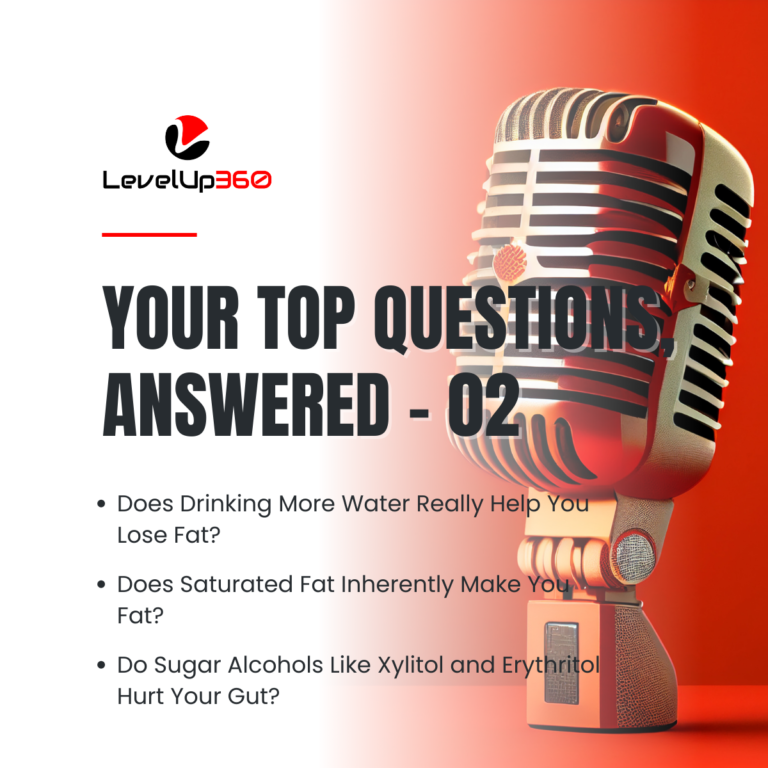
Shedding Light on Creatine: Separating Scientific Fact From Misconceptions
Creatine is one of the most well-researched and effective supplements available for improving exercise performance and training adaptations. As a naturally occurring nutrient found in foods like meat and fish, creatine plays a critical role in providing energy for cellular function, especially during intense physical activity. When supplemented appropriately, creatine can enhance strength, power output, muscle growth, and anaerobic endurance – all of which can support an active lifestyle and functional fitness.
In this article, we’ll explore the research-backed benefits of creatine for physical performance and body composition, as well as insights from emerging areas of research related to bone, brain, and immune health. We’ll also answer frequently asked questions about appropriate dosing, timing, forms of creatine, side effects, and more.
Creatine can be an impactful addition to support fitness goals ranging from athletic achievement to lifelong functional strength and mobility
Creatine for Strength and Physical Performance
Decades of research have demonstrated that creatine supplementation can boost strength and power output when combined with resistance training. For example, a 2003 meta-analysis found a significant increase in bench press strength following creatine use, with an average improvement of about 5kg in the 1-rep max compared to placebo groups. Similarly, a 2015 meta-analysis which included 22 randomised controlled trials found a significant and consistent effect of creatine supplementation on lower limb strength performance. The analysis also demonstrated that creatine supplementation had a similar effect across different populations, training protocols, and supplementary doses and durations.
The primary mechanism underlying these performance benefits is an increase in intramuscular phosphocreatine stores. Phosphocreatine plays a key role in rapidly regenerating ATP during intense muscular contraction, providing energy to support repeated bouts of high-intensity activity. This enhances the capacity for resistive exercise involving multiple sets and repetitions, allowing users to lift more weight and complete more reps before fatigue sets in.
In addition to max strength improvements, creatine has also been shown to enhance power output. Power is a key athletic attribute influenced by both muscular strength and the ability to generate force quickly. By improving high-intensity anaerobic capacity, creatine supplementation during sprint training increased peak and average power outputs compared to sprint training alone in one study.
The performance benefits of creatine extend beyond just powerlifting and sprints. For example, a 6-week study in adolescent swimmers found improved swim times across different distances ranging from 50 to 800 meters. Sports involving intermittent bouts of high-intensity activity seem particularly likely to benefit.
Along with increased strength and power capacity allowing greater overload to be applied during training, the resultant gains in lean muscle mass represent another key mechanism by which creatine enhances exercise performance. Numerous studies employing body composition assessment techniques like hydrostatic weighing and DEXA scans demonstrate greater skeletal muscle hypertrophy over both short and long-term training periods with creatine supplementation.
Creatine for Functional Fitness and Active Living
While much creatine research has understandably focused on athletes and bodybuilders, there are good reasons to consider creatine for functional fitness and active living goals as well. As we age, supporting the maintenance of muscle mass through resistance training becomes crucial for preserving strength, mobility, balance, and independent living. Supplementing with creatine can facilitate greater progressive overload during strength training programs and optimise adaptations. For example, one study in older men and women (average age 71) found the addition of creatine to resistance training increased leg press strength gains by about 20% compared to training alone after 12 weeks.
For those seeking to build lean mass, creatine helps provide an anabolic signal to stimulate muscle growth in conjunction with protein intake and resistance training. But even for those not overly concerned with getting “swole”, boosted strength adaptations can enhance quality of life. Stronger muscles improve daily function, athletic performance, injury resilience, metabolic health, and more.
Creatine and Bone Health
In addition to the well-established physical performance benefits, emerging research has begun to explore the potential effects of creatine supplementation on bone health. Some proposed mechanisms suggest creatine could support bone formation and density. For example, by facilitating greater force generation during muscle contractions, creatine could stimulate mechanical loading effects known to strengthen bones. Creatine is also involved in ATP metabolism in bone tissue itself, so directly augmenting bone cell energy status is another hypothetical benefit.
However, human trials in older adults, the population in whom bone benefits would be most clinically meaningful, reveal fairly underwhelming effects so far. Three randomised controlled studies using daily creatine doses from 1-20g for 6 months to 2 years failed to provide reliable improvements in bone mineral density, mass, or biomarkers associated with bone turnover.
Nonetheless, some caveats exist. In older populations at higher fracture risk, creatine could still theoretically reduce fracture incidence by enhancing strength and physical function even if mineral density itself is unchanged. Younger individuals may also see more substantial bone adaptations, as the skeleton appears most responsive to mechanical loading stimuli earlier in life. So, creatine likely won’t harm bone health, but shouldn’t be viewed as a solution for low bone density on its own.
Creatine for Brain Health and Cognition

Given the high energy demands of the brain, there has been significant interest in determining if creatine supplementation can improve cognitive function and neurological health. Creatine plays a key role in brain energy metabolism, and deficiencies are linked to neurodevelopmental disorders. However, the effects in healthy individuals appear much less robust than the physical performance benefits.
A 2024 systematic review and meta-analysis by Xu et al. provides further insights into creatine’s effects on cognition. The analysis included 16 randomised controlled trials with 492 participants aged 18-76 years. Creatine monohydrate was used in all studies, with doses ranging from 5-25g/day and intervention lengths spanning 1 week to 6 months.
The meta-analysis found that creatine supplementation resulted in small but statistically significant improvements in memory, attention time, and information processing speed. The memory benefits were supported by moderate-certainty evidence per GRADE criteria. However, no significant improvements were seen for overall cognitive function or executive function.
Notably, stronger cognitive benefits have been observed in specific scenarios like sleep deprivation, depression, traumatic brain injury, and neurodegenerative diseases.
The current evidence suggests that creatine supplementation may provide modest cognitive benefits, particularly for memory. However, despite recent hype on social media, these effects are most apparent in specific scenarios and unlikely to be practically significant for healthy individuals. For the average healthy person looking to enhance brain function, the current evidence does not support creatine supplementation solely for this purpose. But research continues to emerge.
Creatine and Immune Health
A common question is whether creatine influences immune system function and infection risk. In healthy populations, there is no evidence that creatine impairs immune cell function or increases illness rates. A 3-year study of college athletes found no difference in days missed due to illness between creatine users and non-users. Mechanistic data is mixed, with some studies showing potential anti-inflammatory effects but others indicating possible immune cell activation suppression. However, these mechanisms have not translated to impaired immune defence. As with the brain, maintaining adequate cellular creatine levels seems crucial for proper immune cell function, but excess creatine availability shows minimal effects. Those with compromised immune systems may wish to exercise caution with creatine supplementation, but it appears neutral for most folks.
Frequently Asked Questions
- What is the ideal form of creatine to supplement with?
Creatine monohydrate remains the gold standard due to its affordability, safety, and vast evidence for efficacy. Alternative forms like creatine ethyl ester or buffered creatine are not superior despite higher price tags. - When is the best time to take creatine?
Timing doesn’t appear to matter much for saturating muscle creatine stores. Taking 3-5g per day consistently is effective for physical performance, muscle gain, and exercise capacity. If loading with 20g per day, splitting into 4 equal doses is reasonable. Some prefer post-workout consumption for convenience. - Does creatine cause weight gain?
A 1-2kg increase in body weight is commonly seen with creatine loading thanks to increased intramuscular water storage. This does not negatively impact body composition and can enhance a muscular appearance. - What are the side effects of creatine?
Gastrointestinal discomfort is the most frequently reported side effect. This can often be mitigated by lowering your dose, increasing fluid intake, and fully dissolving the powder. Kidney and liver dysfunction are not concerns for healthy individuals. - Can creatine cause hair loss or cramps?
Apart from one small study reporting increased DHT levels, there is minimal evidence creatine accelerates hair loss. Effects are likely only a concern for those with a strong genetic predisposition. Cramping has not been consistently linked to creatine either. - Does creatine require cycling?
Unlike some other supplements, there is no evidence that creatine needs to be cycled. Maintaining elevated muscle creatine levels is safe long-term without cycling off for periods.
Conclusion
With decades of research demonstrating meaningful benefits for physical performance, muscle gain, and exercise capacity, creatine remains one of the most effective sports supplements available. While emerging areas of research like bone and brain health are intriguing, the robust data on strength, power output, and body composition make creatine monohydrate an accessible performance-enhancing supplement for recreational trainees and athletes alike. With appropriate dosing, few side effects, and ample long-term safety data, creatine can be an impactful addition to support fitness goals ranging from athletic achievement to lifelong functional strength and mobility.
Recommended reading
Recommended reading
Additional Resources
Feeling in control of your health
If you are interested in improving your health and wellness, check out other resources such as Our Blog, Free Resources and/or join our private Body-Mind Transformation Secrets Community on Facebook, and go on an even deeper dive with me to uncover how to succeed in your health and wellness goals.
You may also be interested in our Sleep Secrets Cheat Sheet. It is a great resource with strategies to fix and optimize your sleep which is crucial to succeeding in your health and wellness goals.
Resources
Pictures








